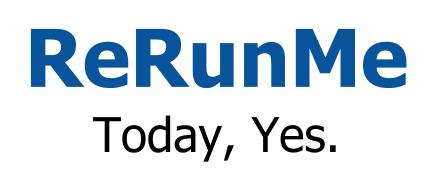
Today Yes Mindset
This article introduces the ReRunMe motto and mantra. It describes how you can use the phrase as a tool to clarify your intent, or to motivate yourself, or to make a statement to others. These three applications are the three keys to gates which can suppress health and activity action (intent, motivation, social perception).
‘Today’ is a very specific temporal word. It is not as specific as ‘now’, but it is broader in that it sets an intention within a defined period of time that clearly repeats… daily.
‘Yes’ is a word of affirmation and agreement and realisation, that brings something in or shares it outward. Think of the posture of an athlete when they have nailed a performance in their sport – they either single or double fist pump (like Tiger Woods; a strong inward confirmation gesture), or they stand tall and raise their arms like a Y (like a gymnast’s landing position; a social sharing gesture). Think about your child’s facial expressions whenever you finally answer yes, as opposed to answering no. The word yes also brings permission, a positive outlook and hope, so use it!
It is not just the words we use, but how we use them. Punctuation around these two words in their written form is also important. Spoken language uses elements like emphasis, intonation and timing to add meaning. Punctuation helps us to decipher those meanings in the written word. How you read the words with punctuation is how you say it.

CLARIFYING INTENT: Today? Yes.
Posed as an inward question and answer, the two words serve as a self-assessment and affirmation related to a health task. You find yourself asking “In this situation, needing to do this, will I?” If you can’t or don’t answer, you can guess what happens! If you think too hard and overwhelm yourself, you can guess what happens! It’s your health – confirm your intent with these two words.
This can be used in any number of situations, such as these:
- I only have 5 minutes. Should I set my bike up for a ride tomorrow?
- If I take the stairs, will it even matter?
- I’m already tired/sore/late, but I’m only ¾ done.
- Will I let the kids join me on this run?
- It’s cold and foggy this morning… I’m meant to swim laps.
MOTIVATING YOURSELF: Today? Yes!
As a question and exclamation, the two words reflect a step up in an existing level of engagement. There is an aspect of drive and excitement for the health action. You’ve been looking forward to doing x, y or z, and today is the day. Doing the groundwork and being prepared has given you confidence.
You might be moving up from walk-run patterns to continuous running. You might be strong enough to make it up all the stairs at work. You might be ready to complete your strength circuit without standing still. You might be headed to a department store to update your wardrobe. You might have entered a local race or event you have been preparing for. You might be lining up with a team for the first time in a decade.
Think about when your child wakes up and asks you what day it is, and you reply “Saturday”. That’s the emotional feel of the Yes we are talking about here! Think heightened tone, energetic posture, and a sense of opportunity.
You can also say this the very same way after completing a health related action – as a confirmation of success, an internal reward, a statement of closure on having done what you knew you needed to do.
MAKING A STATEMENT: Today, yes.
Posed as an external statement or response, the two words are succinct and position-defining. Others may ask you questions, sow seeds of doubt, challenge you, or tease you. Often the best way to respond is not to engage in detail or discussion, but to give a simple, short and direct answer. What fits this quite well is: Today, yes. Then, use the words’ internal intent and motivation to continue the action.
It’s only your action that is going to impact your health, so you need to deflect unhelpful interference.
Use “Today, yes.” as a response in situations where someone comments:
- “I see you’re using the stairs again, huh?”
- “Why do you bother doing those exercises? Does it even help?”
- “You trying to lose some weight or something?”
- “Mum, do we have to go to the park again?”
- “You’re going to do that again I see.”
- “It’s raining. You’ll get wet.”
- “We are running late. Do you have to do the last set?”
By saying “Today, yes.” you communicate your intent and act as a role model for others in taking action for your health. As a short direct reply, it shows that in that moment you have the self-discipline to do what needs to be done. It’s your health, and you are in control of it.
SELF-TALK AND PERFORMANCE
Research on self-talk and performance (see references below) has shown that to improve task performance it is more effective to be interrogative (like Bob the Builder) than affirmative (like The Little Red Engine). While on face value this advice may seem childish or simplistic or irrelevant, the difference in perspective and effect is distinct (and we are not talking about children!).
- Bob the Builder = interrogative
- “Can we do it? Yes we can!”
- There is belief and assertion when facing the challenge.
- You are interrogating yourself, then telling yourself you can do something.
- STRUCTURE: Ask a question. Answer it.
- The Little Red Engine = affirmative, introspective
- “I think I can, I think I can…”
- There is optimism but no assertion when facing the challenge.
- You are suggesting you can do something, but you won’t know until later.
- STRUCTURE: Repeat a mantra that may contain doubt and have no confirmation.
The main difference between the two is that in one you are telling yourself that you can, and in the other you are telling yourself that you think you can.
Today, yes is an assertion, on a decision, in the present.
References:
Senay, I., Albarracín, D., & Noguchi, K. (2010). Motivating goal-directed behavior through introspective self-talk: the role of the interrogative form of simple future tense. Psychological science, 21(4), 499–504. https://doi.org/10.1177/0956797610364751


